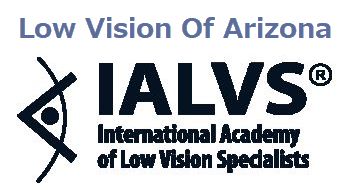
Low Vision Aids and Glasses For Macular Degeneration
At The Practice Name Low Vision Center, we aim to help you achieve better vision. To help improve your vision and reduce the progression of macular degeneration, we recommend various low vision aids and glasses, as well as the best nutritional supplements, to our patients.
Low Vision Eyeglass Options May Include:
Bioptic Telescopic Glasses
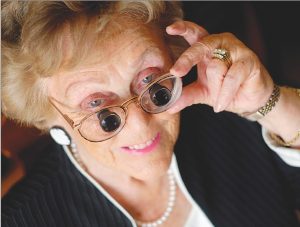 Bioptic telescopic glasses or bioptic lens system is a combination of a telescope and two optical lenses. The telescopes are attached to the lenses of the eyeglasses. Bioptic telescopes can enhance the vision of macular degeneration patients. With this low vision aid, patients can see better at any distance. The low vision glasses are also used for watching television, identifying faces, signs, blackboards, and lots more.
Bioptic telescopic glasses or bioptic lens system is a combination of a telescope and two optical lenses. The telescopes are attached to the lenses of the eyeglasses. Bioptic telescopes can enhance the vision of macular degeneration patients. With this low vision aid, patients can see better at any distance. The low vision glasses are also used for watching television, identifying faces, signs, blackboards, and lots more.
Low Vision Magnifying Reading Glasses
Low vision magnifying reading glasses are also recommended for macular degeneration patient to help enhance their vision for reading print. The glasses will magnify the fonts and make it easier for the patient to read.
Prismatic Eyeglasses
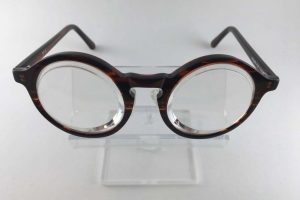 Prismatic Eyeglasses are excellent examples of low vision magnifying reading glasses. Prismatic eyeglasses are extra strong reading glasses. They provide space for a natural, comfortable focal point. Prismatic eyeglasses feature optical quality spherical lenses which magnify and converge the image concurrently. They are useful for reading aids.
Prismatic Eyeglasses are excellent examples of low vision magnifying reading glasses. Prismatic eyeglasses are extra strong reading glasses. They provide space for a natural, comfortable focal point. Prismatic eyeglasses feature optical quality spherical lenses which magnify and converge the image concurrently. They are useful for reading aids.
E-Scoop Glasses
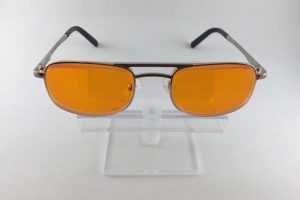 E-Scoop glasses are custom designed optics which combine five unique optical characteristics to improve the vision of the patient suffering from macular degeneration. These five optical features increase image size, improve contrast, allow more light into the eye, while allowing the user to wear them constantly.
E-Scoop glasses are custom designed optics which combine five unique optical characteristics to improve the vision of the patient suffering from macular degeneration. These five optical features increase image size, improve contrast, allow more light into the eye, while allowing the user to wear them constantly.
Special Binoculars Or Telescopes
Special prescription binoculars or telescopes that are mounted on the glasses are useful for various activities such as watching the grandchildren play sports, enjoying the theater, watching television, taking in a baseball or football game, recognizing faces, appreciating the scenery, exploring a museum, reading a McDonalds menu and lots more.
Personalized Optical Systems That Use Microscopic And Telescopic Lenses
Our low vision doctor, Low Vision Doctor Name, can also recommend customized, prescription optical systems for macular degeneration patients. These optical systems feature microscopic, telescopic, prismatic, and filter lenses to maximize images and objects.
Closed Circuit Television (CCTV) Magnifiers
CCTV magnifier is a combination of a camera and TV screen used to provide low vision aid for macular degeneration patients. The camera is pointed at an object while a magnified image will appear on the screen. The patient will be able to see the magnified image that appears on the screen and use it to work in real time.
Hand-Held And Desk-Top Magnifiers
There are also hand-held and desktop video magnifiers. These low-vision magnifiers come in a variety of strengths, light, color contrast, and magnification capabilities. While some are handheld, others can be connected to the computer.
OrCam
OrCam is another device that is changing how people with macular degeneration and other low vision issues can perceive the world. The OrCam features a camera, speaker and a cable connected to a larger device. This tiny device is attached to the patient’s eyeglasses. OrCam uses AI technology to help people with visual impairment read texts, recognize faces, identify products, and more.
IrisVision
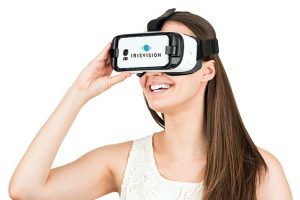 IrisVision is a wearable device that comes with advanced virtual reality technology. With this, patients with macular degeneration can carry out their daily activities easily. IrisVision offer about 70-degree field of view. With this, patients can see the world clearly and fully. One disadvantage of iris vision is the inability to walk around while wearing the device.
IrisVision is a wearable device that comes with advanced virtual reality technology. With this, patients with macular degeneration can carry out their daily activities easily. IrisVision offer about 70-degree field of view. With this, patients can see the world clearly and fully. One disadvantage of iris vision is the inability to walk around while wearing the device.
Above all, this low vision device features multiple view modes depending on the activity you intend to do. Whether you intend to watch television, read texts, or have a general view, you can switch between TV Mode, reading modes, or scene modes respectively. IrisVision provides a cost-effective and efficient way for you to live a quality life when you have macular degeneration.
Our low vision doctor, Low Vision Doctor Name, will examine the situation of your eye and the severity of the condition. With this, we can recommend the ideal low vision aids or glasses for you.
What Other Advanced Technology Is Available For Macular Degeneration?
Advances in technology have made it possible for patients with low vision conditions such as macular degeneration to live and work just like individuals with normal vision. This has led to the development of telescopic implants known as Implantable Miniature Telescope (IMT). These IMTs will help to enhance visual acuity by reducing the effect of the central “blind spot” caused by macular degeneration. In the future, the condition may be managed by using advanced stem-cell treatment procedures.
Contact Us Today
If you have been diagnosed with macular degeneration, there is still hope for you. Contact us today at The Practice Name Low Vision Center. Our low vision doctor, Low Vision Doctor Name will be available to speak with you and discuss your options. We will carry out a comprehensive eye exam to determine your eye condition. If you are diagnosed with AMD, we will provide you with personalized low vision glasses to help you regain visual activity and begin to do the things you want to do again.
